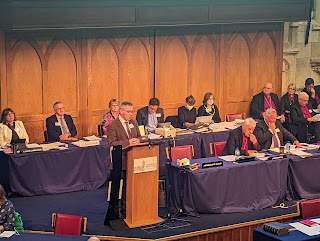ClimateAction - Church of Ireland approves motion to divest from fossil fuels
This article was published by the Climate Action Programme on 14 May 2018
Church of Ireland approves motion to divest from fossil fuels

The Anglican Church in Ireland has voted to put an end to its major investments in fossil fuel companies.
The decision came at the church’s annual General Synod meeting last week, after a motion was put forward by a private member.
The move means the Church of Ireland is now committed to removing investments from all companies which derive more than 10 percent of their income from fossil fuels. The motion has a target date of 2022, slightly amended from 2020 by other members.
At the same time, the church intends to continue supporting renewable energy investments and new environmental projects. Its exposure to fossil fuel companies has already declined from 11 percent to 2.5 percent in the past seven years.
Stephen Trew, who put forward the proposal, highlighted the moral urgency to address the increasing impacts of climate change in Ireland, and around the world.
“This leads us to a profound ethical question. How can we continue to fund our mission by investing in fossil fuels when they cause human suffering? There is a strong ethical case to end fossil fuel investments. But it also makes sound financial sense,” he stated.
The Church of Ireland’s decision mirrors a 2015 act by the World Council of Churches, which pledged to never invest in fossil fuels on moral grounds.
Mr Trew said that setting the rate at 10 percent makes a similar statement to how the church excludes tobacco companies from its investment fund.
“Let us mark the day, when with God’s help, we decided that the Church of Ireland is truly an ethical investor and excludes all fossil fuels,” Trew added.
Not all church members were in agreement though; the chairman of the investment committee argued that natural gas was an important technology to help make the transition to renewables, and that flexibility was needed.
Despite these protests, the motion was eventually passed by the Synod’s 500 members.


Comments